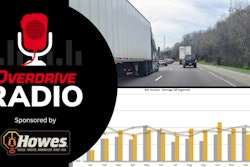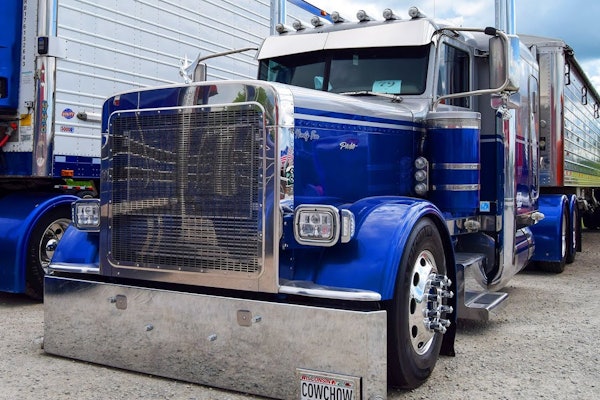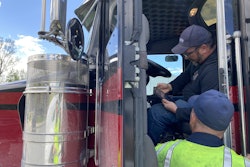In this week's edition of Overdrive Radio, drop into our conversation with OOIDA Executive Vice President Lewie Pugh at the Mid-America Trucking Show.
Pugh was fresh off a whirlwind round of a whole lot of other talking himself, including a MATS-opening breakfast panel discussion you heard here a couple weeks back, then prior to that on Wednesday the week of the truck show in the halls of Congress. There, he joined a panel of trucking and other industry reps to talk through significant issues ahead of the highway bill reauthorization due next year.
Pugh made headlines for his urging of federal reps to get a handle on the scope of so-called “non-domiciled CDLs” issued to residents of foreign countries by states here in the U.S. for work trucking OTR or in other industries on a temporary basis. It’s an issue that’s risen to prominence this year as attention to it has increased, and but one of the issues Pugh addressed in Congressional testimony, likewise in what follows in the podcast.
In the wake of reporting from MATS, though, we also heard about the issue from trucker Teresa Brittain, who flagged the importance of the English language proficiency regs in particular when it comes to roadside inspections.

English proficiency violations were once treated by the Commercial Vehicle Safety Alliance of inspectors and industry as an out of service violation, yet when CVSA removed them from the OOS criteria about a decade ago now, FMCSA subsequently relaxed guidance on how to enforce the violation itself. Paired with some DOT changes for states around non-domiciled CDLs that happened later, it seems to have gotten simpler for foreign country residents to come into the states to work over the road with a CDL. How many such people are working in the U.S. today? Nobody can really answer that question, as has been evident from Overdrive’s Alex Lockie’s ongoing reporting around the issue.
[Related: CDL schools call out 'threat' of 'unscrupulous training entities']
Update, April 29, 2025: On April 28, President Donald Trump signed an executive order to the DOT to work to restore the English language proficiency regulation to an out of service violation and to rescind 2016 guidance issued by FMCSA to inspectors that relaxed enforcement of the regulation generally. The order also directed an accounting of the issuance of non-domiciled CDLs by states.
Teresa Brittain referenced her MATS conversation with Kentucky state truck enforcement about the issue. “How does any state law enforcement officer do an inspection on the truck if the driver cannot follow instructions to inspect it?” she asked.
Inspectors told her essentially they can’t inspect such an operator’s truck, she said, “for their own safety. They told me they give 15 minutes after the initial request for the driver to contact their company and provide driver's license and required paperwork, then just let them go if the paperwork is compliant.”
No inspection for the truck.
Considering such dynamics, Terea Brittain then quipped, “Next inspection, I’m speaking Martian!”
 Overdrive Radio's sponsor is Howes, longtime provider of fuel treatments like its Howes Diesel Defender all-weather mileage booster and winter anti-gel treatements to get you through the coldest temps, the Howes Multipurpose penetrating oil, and other products.
Overdrive Radio's sponsor is Howes, longtime provider of fuel treatments like its Howes Diesel Defender all-weather mileage booster and winter anti-gel treatements to get you through the coldest temps, the Howes Multipurpose penetrating oil, and other products.
[Related: Trump executive order: Truck drivers must speak English]
Efforts are under way within CVSA to get the English-proficiency violation back into the out of service criteria for these and other reasons, which you’ll hear about in my talk Pugh. OOIDA, along with some from the law enforcement community, petitioned CVSA to return English proficiency to the out of service criteria, and CVSA’s spring Workshop event is but one week away.
Pugh noted owner-operators might stay tuned for any news on that front in the coming couple of weeks. Run through these and other issues -- broker transparency, owner-operator tax, per-diem deductions for company drivers, overtime pay, parking and more -- in the podcast:
Also in the podcast:
RaceTrac Travel Centers Marketing Manager Nick LaFalce details growth in his company’s mostly Southeast regional network of truck stops in what was once mainly just a fuel-stop network for automobile drivers. Since 2018, the RaceTrac company’s been expanding high-flow diesel options and acquiring land to even add parking options within the network. LaFalce expects the diesel network up over 100 locations by the end of the year. Hear much more in the podcast.
As mentioned in the podcast:
**Overdrive Senior Editor Matt Cole's recent coverage of the parking issue
**More from MATS
[Related: Arkansas to fine drivers $500 if they can't speak English proficiently]












